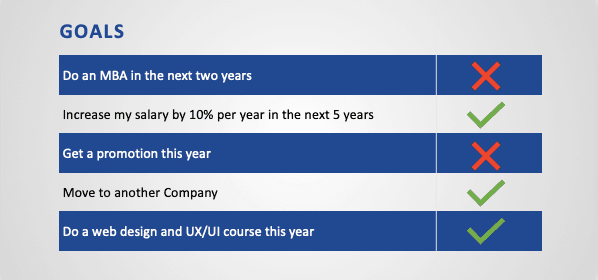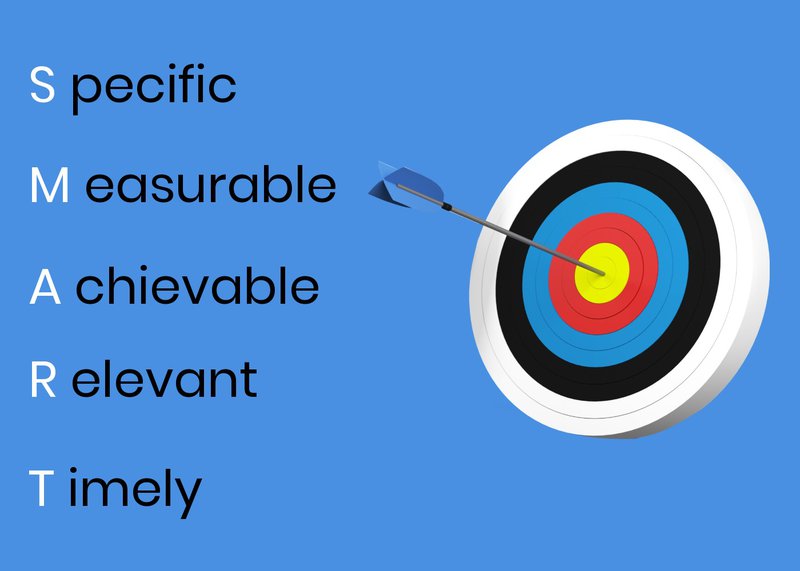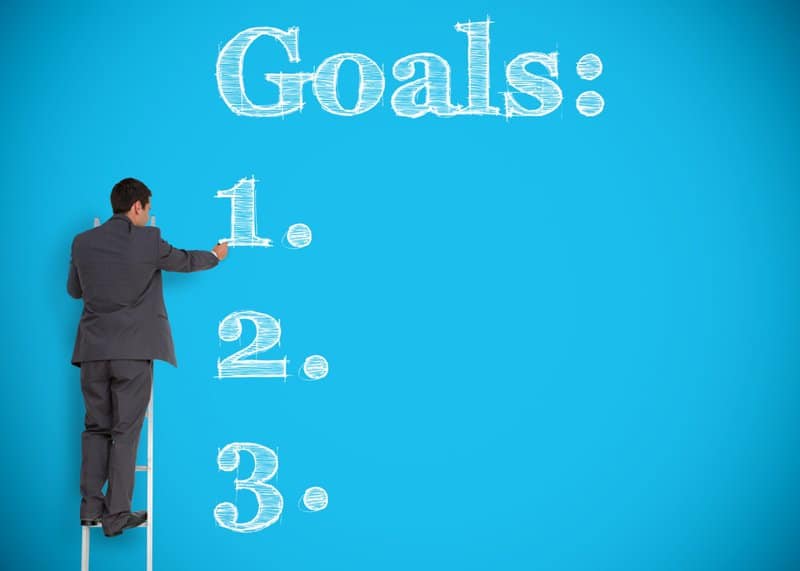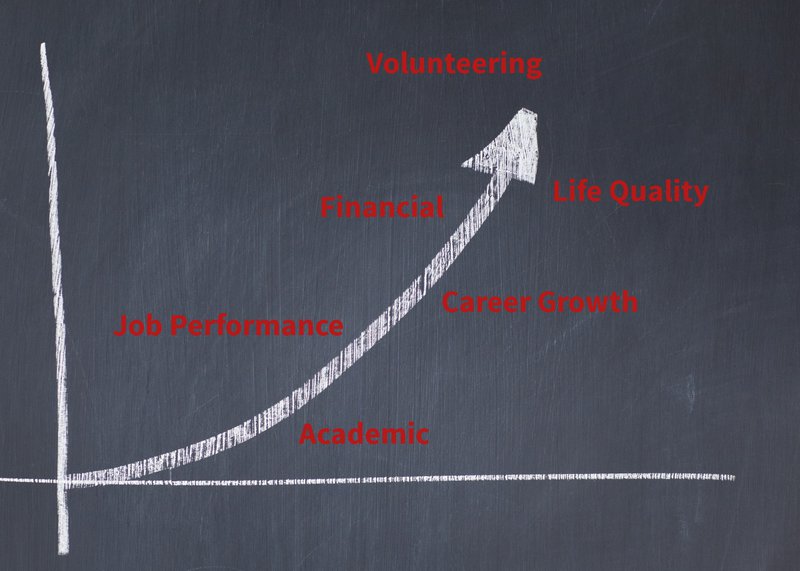How many people do you know who have set goals all the time but rarely stick to them long enough to see any progress? That’s a common mistake and one of the easiest to solve when you learn and understand how to achieve your career goals the right way.
Planning and setting your goals the right way, besides tracking progress and fixing your mistakes, will make all your efforts and patience worthwhile, and that’s what will define your level of success in the future.
However, it’s not the easiest thing to do. There’s this habit of setting too many goals at once and jumping from one to another without finishing the previous.
The mind needs to be focused on one thing long enough until it becomes a reality, and you can see yourself achieving it. In the next topics, you will see the steps to understand how to achieve your career goals.
How To Achieve Your Career Goals?
If you’re serious about reaching the objectives you’ve set this time, here are some things to do to make sure you’ll succeed:
- Define What You Want in Your Career
- Remind Yourself of the “Why.”
- Be Specific When Trying To Define Your Career Goals
- Choose 1-3 Big Goals
- Break Them Down Into Simple Steps
- Find “MentorsKeep”
- Surround Yourself With Like-Minded People
- Read About Other Successful People
- Plan And Take Small Steps Daily
- Track Progress
- Visualize Success
- Celebrate Small Achievements
- Keep Up With the Motivation
- Be Patient
1) Define What You Want in Your Career
Sometimes people aren’t sure what they truly want, which leads to spending much time going after one goal to realize they don’t want that.
So it’s easier to get clear about what you don’t want first. Be specific and describe your ideal lifestyle, whom you want to be in the future, and what should be removed from your current life and profession so that you can get there.
Most often, the beauty of life lies in eliminating the unnecessary so that you can experience, have time for and appreciate the essentials.

Maybe there are toxic people you spend time with daily who always put you down and talk you out of your dreams. You don’t need them. What’s more, they are preventing you from moving forward.
After all, you’re similar to those you spend the most time with. So choose wisely whom you’re surrounded by.
What about the mundane tasks you have to do daily?
The ones that don’t necessarily need to be completed by you, and because you don’t have enough time to work on your passion project, that’s your escape from this lifestyle. In this case, delegate what you can.
Alternatively, maybe you don’t like the place you live in, the job you’re working, or the inability to travel whenever you want. Don’t worry.
Everything’s possible. The ultimate freedom and independence are just a few goals away.
Start working on what you believe in today, dedicate time to it daily, and start doing your research and creating a vision of where and how you want to be in your career.
Look for better jobs, or start doing your research on what it takes to move to a better and cheaper country or State, where you’ll feel like you’re on holiday all the time. Talk to people, gather information, make a plan. That’s how it all begins.
2) Remind Yourself of the “Why.”
Behind every goal, there’s a reason why you want it for yourself or your career and your organization.
Also, that’s the reason you should remind yourself as often as you can. So write down that goal. Visualize having this in your career already and put that vision on paper. Then, go through it daily and review your progress weekly.
All this will let you stay focused on your career and your organization’s values. Mundane problems won’t lead you astray from them if you keep your “why” in mind all the time.

The thing is, there are so many things to distract you from your chosen path in life, like daily life problems, other people’s concerns, social media, random thoughts, negativism, self-doubt, procrastination, mundane tasks, or else.
It gets harder for you to ignore them when combined as they are always fighting for your attention. Here’s when your “why” can help to understand how to achieve your career goals.
Your vision should be so clear, and your reason for going after your goal must be so strong that no distraction can get in the way.
Remember, there’s a reason behind anything you want and do in your career and life. Moreover, it can inspire you to move forward if you remind yourself of it often enough. It’s why you started in the first place.
However, it’s not usually apparent. That’s why you should dedicate some time to analyzing your behavior and deepest desires. It’s always better to know why you do what you do and be aware of the motives.
Once you understand them better, you’ll control how successful you are, get more done, and see results faster.
3) Be Specific When Trying To Define Your Career Goals
Often people’s ideas of what they want to achieve are too vague. Not knowing what you wish to precisely means you may get something completely different. That’s why reasonable goals are super-specific.
Include a number, a deadline, how your career or your organization will look like when you’ve reached it, what will be different, how you’ll feel about it, among others. Establish KPIs (Key Performance Indicators).
Remember about the SMART methodology:
- Specific: Goals are well defined and precise.
- Measurable: Goals are possible to measure.
- Achievable: Goals can be achieved.
- Relevant: Goals need to be important to you, your career, or your organization.
- Timely: Goals need to have a particular timeframe.

You’ll have to be honest with yourself to do this exercise right. Let go of expectations, other people’s opinions, and the conventional path society wants you to follow.
Then, ask yourself some questions and get to your inner self to answer them honestly. Be honest with yourself about the risks and the chances of accomplishing these goals.
Add to that every single thing that you’re passionate about or arouses some enthusiasm in you. The stuff you care about will always stand out from the rest. If you take a closer look, you’ll notice them. That’s when you can set goals and make them specific.
4) Choose 1-3 Big Goals
Let’s be clear about how to achieve your career goals; honestly, you need to be concentrated on them while eliminating all distractions that come in the way.
These may be people trying to talk you out of it, daily worries and issues, bad habits of yours, procrastination, mental barriers like fears, uncertainty, and so on.
So be selective and keep in mind that your time and focus are limited, and that’s why you should dedicate them to 3 or fewer goals at first.

Less is better than more in this case too. That gives you the chance to do things right, experiment, make mistakes, learn from them, see what works best for you, and eventually improve your techniques.
That’s one of the main reasons New Year’s resolutions usually fail, and it’s also why people can’t focus while working on a task.
Our mind just isn’t programmed to do many things at once. It performs best when single-tasking.
It’s the same with goals. Setting many of them leads to failure.
However, deciding to be after 1 to 3 big things in your career or life lets you focus your attention, energy, and time to see results soon. So choose one goal this time, but give it all your focus.
Then, achieving your next goals will happen faster.
5) Break Them Down Into Simple Steps
The big picture is overwhelming. That’s why many people don’t even get started with their goals because they only have the result in mind.
However, in reality, every big project is a combination of many small steps. It would be best if you got to them. Break down your career goal into more manageable tasks to complete. Then do it again until you have easy ones to do each day that won’t take much time.
You will need to focus on finishing your three-month course on digital marketing before getting to write your book. Alternatively, maybe you would like to complete an important project at your company before starting your MBA.
Focus is important. Break down in these small projects; this way, you’ll know what to do precisely and feel accomplished after each such tiny action.
This means getting a motivation boost daily and thus making sure you achieve the goals you’ve set.

Breaking into small steps will help you understand how to achieve your career goals and your time to accomplish them.
6) Find “MentorsKeep”
Another way to learn from those already at the top is to approach them whenever possible and ask for advice.
Finding a mentor may not be easy as such people are often too busy. However, you can get familiar with their working process, for example, and implement similar strategies to make the best use of your time.
There will be moments when you’ll feel discouraged, hopeless, and like giving up. It’s better to have someone to remind you of why you should keep going.
This person will inspire you and will support you when you’re weak. Share your goals with loved ones who will motivate you and know how important that is for you.

So that’s how you stay motivated with your goals and deal with obstacles on the way, distractions, and moments of weakness.
We all strive for excellence one way or another, but with all the distractions of today’s world, it’s hard to consistently stay motivated with your goals, even if you’ve defined them in detail. So make sure you find like-minded people with similar goals.
7) Surround Yourself With Like-Minded People
You’re the average of the five people you spend the most time with, so you’d better choose them carefully and make sure their thinking resonates with your vision.
In your personal life or at the company, you have to choose your teammates wisely.
Even the most influential people have problems that are no different from yours. According to Ophra Winfrey:
“Surround yourself with people who are only going to lift you higher”
Surrounding yourself with other great people allows you to learn more about yourself and keep going on the right path.

Also, open your eyes to the toxic people in your life and career; do everything possible to be around them less. Then, get out there and find the ones with similar goals that will inspire and support you.
8) Read About Other Successful People
Analyzing the life of the greatest men in history and nowadays is a great habit. Our leadership guide mentions that most of these people faced some pretty significant hurdles along the way.
Henry Ford failed and broke five times before successfully developing and manufacturing the first automobile many middle-class Americans could afford.

Before launching Microsoft, Bill Gates built a computerized system for government agencies; however, the product was deemed “unacceptably buggy” and failed miserably.
Reading about how these people overcame their problems and reached the top can give you great reasons to stay motivated with your goals.
So take the biography of someone you admire and dive into his life. Learn from his mistakes, find inspiration and wisdom in his words, see what made him thrive, and make the necessary changes to your approach.
Here is a useful list that Forbes listed the main biographies of successful people:
- Shoe Dog by Phil Knight (Nike).
- Personal History by Katharine Graham.
- The Snowball: Warren Buffett and the Business of Life by Alice Schroeder.
- Benjamin Franklin by Walter Isaacson.
- Titan by Ron Chernow (about John D. Rockefeller).
- Carnegie by Peter Krass.
- Morgan, American Financier by Jean Strouse.
- The Patriarch by David Nasaw (about Joseph P. Kennedy).
- Sam Walton, Made in America by Sam Walton/John Huey.
- I Love Capitalism! By Ken Langone (about the Home Depot co-founder Ken Langone).
- Jack, Straight From the Gut by Jack Welch.
- The Everything Store: Jeff Bezos and The Age of Amazon by Brad Stone.
- Elon Musk by Ashlee Vance.
- Wild Ride by Adam Lashinsky (about Travis Kalanick, Uber co-founder).
- A Triumph of Genius: Edwin Land, Polaroid, and the Kodak Patent War by Ronald K. Fierstein.
- Bloomberg by Bloomberg by Michael Bloomberg.
- Make Trouble: Standing Up, Speaking Out, and Finding the Courage to Lead by Cecile Richards (about Planned Parenthood Federation of America President).
- The House of Dimon by Patricia Crisafulli.
9) Plan And Take Small Steps Daily
Making a plan will help you take steps to achieve the goals you set.
Now that you know what you want and have a list of actions that will take you there, you need to find a way to do something daily. Consistency is the only way to move forward.

Doing something about reaching your goal must become a habit of yours, and you need to prioritize by putting it on top of your to-do list.
To make things easier, set a fixed time daily when you’ll do that. It may be during your most productive time and in the first part of the day. Doing it before or after something you already do (an ingrained habit) is another way to simplify the process.
10) Track Progress
You need to be aware of what’s working and what’s not and see if there’s any progress at all.
That’s when tracking comes in handy.
Write down the daily actions you take connected to your goals. Include the time, how long each took, how you felt about it, and whether you could do it better.
After some time, go back to analyze the results and make adjustments.
For your career, some examples of KPIs could be:
- Academic: Degree you want to reach in the future.
- Work success, as your internal KPIs assessment by your boss or peers.
- Career growth: your promotion speed and the time you will be in the same job function.
- Financial: salary, bonus, or rewards.
- Life Quality: Vacation days or flexible working hours.
- Volunteering: Time spent volunteering, giving back to society, or in the charity sector.

When you’re the entrepreneur, your organization is attached to your career success, so establish clear KPIs for your company too:
- Profit.
- The average cost of goods sold.
- Overhead.
- Customer acquisition cost.
- Net promoter score.
- Customer per region.
- The number of monthly deals.
- Revenues per month or year.
- The number of employees.
- Employee satisfaction index.
- Turnover rate.
- Etc.
Successful people review their days in the evening and immediately plan out what they have to do the next day, which helps them stay on track and never lose focus. Having this habit is quite useful to avoid all the distractions during the day.
11) Visualize Success
Change happens on the inside first.
That’s why you need to create a vision and stay true to it. Only when you focus your mind on one goal long enough and take action towards it consistently can you see it becoming a reality.
Visualization is a powerful practice that successful people have been doing for decades.
It takes some time before you get used to it, but you’ll get better and quickly see results.
Successful people have realized that they have to change their behavior and habits to transform themselves and their lives.
People often underestimate the power of a single habit, but what we repeatedly do has a significant effect on our lives. If you don’t visualize your success, you may not change your habits and keep a negative behavior.
Richard Branson had failed several times with Virgin Cola, Virgin Publishing, Virgin Clothing, among others. However, he always kept an optimistic view. He has written once:
“I suppose the secret to bouncing back is not only to be unafraid of failures but to use them as motivational and learning tools. … There’s nothing wrong with making mistakes as long as you don’t make the same ones over and over again.”
It’s nothing more than sitting still, emptying your mind of all thoughts connected to unimportant things and daily problems, and focusing it solely on your vision. Imagine your success in detail.

Draw a picture in your mind of how your life will look once you’ve reached your goal, and try even to feel powerful and prosperous.
It’s like meditation, and your mind needs to be concentrated on one thing so that it can reach subconsciousness. That’s when you’ll start noticing some beautiful changes happening in reality too.
12) Celebrate Small Achievements
If you’re serious about getting ahead in your career and making your vision come true, then you’ll need to make a step-by-step plan and stick to it. Make sure you break significant steps into smaller ones to not overwhelm you just by looking at them.
This way, you’ll know what action to take every day, and it will be achievable and straightforward.

Celebrate the great meeting you had with your client and the successful project that concluded at the end of your one-week course or the comprehensive and positive assessment you had from your boss.
Count your daily successes, admit them, see progress, and celebrate it. Celebrating small achievements will help you stay motivated with your goal.
What’s more, after each, you’ll have a sense of accomplishment that will help you build momentum and replicate this small win.
13) Keep Up With the Motivation
Motivation is the key to reaching our goals, and you need short-term motivation to achieve long-term goals.
That means that you’ll need to find inspiration at every step of the journey to keep going and never lose your vision.
So how do we stay motivated until we make our dream come true?
First, make sure you truly want that. Too many people spend a considerable amount of time going after something only to understand that it won’t make them happy and it wasn’t what they wanted.

Don’t make that mistake. Assess your goals today and be honest with yourself. Then, find ways to boost your motivation in daily life.
14) Be Patient
We all want to reach our goals eventually, but too many of us aren’t willing to give them enough time.
People want fast results, and if they don’t see progress on something any time soon, they lose hope and give up. But big things start small, and they take time.
That’s the price you pay for going after a long life, career, or company transformation, and it’s worth it. Accept that achieving the goals you set will be a long process; you’ll be learning and getting better at it over time.

Even your vision may change somewhere on the way, but you’ll keep going. The small victories I just mentioned are one great way to make sure that time is much more enjoyable.
Seeing results sooner means you build momentum on moving forward. Also, one action leads to another, so make sure you take a step daily.
Wrapping Up – How To Achieve Your Career Goals?
Setting objectives for your career is one thing, but going after them and trying to reach your goals until they become a reality is entirely another.
It’s not an impossible mission, but there are some mistakes you can avoid that many people make.
Understand how to achieve your career goals following these comprehensive steps:
- Define what you want and don’t want in your career.
- Remind yourself of the “Why.”
- Be specific when trying to define your career goals.
- Choose 1-3 big goals.
- Break them down into simple steps.
- Find “MentorsKeep.”
- Surround yourself with like-minded people.
- Read about other successful people.
- Make a plan on how to achieve your career goals by taking small steps daily.
- Track progress.
- Visualize success.
- Celebrate small achievements.
- Keep up with the motivation.
- Be patient.
What’s more, knowing you’re getting closer to the ideal career and lifestyle itself is a motivation boost, which will help you be patient until you see results. It all comes down to how bad you want it and how much thought you put into finding short-term motivation.
Everything else will fall into place. Knowing your hits and mistakes will make your journey easier.
Which one do you struggle with the most? Also, what else can make it easier to reach your career goals?

Christian has over ten years of experience in marketing agencies. Currently, he has been dedicating his time to a tech startup and also writing for major publications. He loves podcasts and reading to keep up with the latest trends in marketing.

good content!
I couldn’t resist commenting. Exceptionally well written!
Thanks, Helaine.